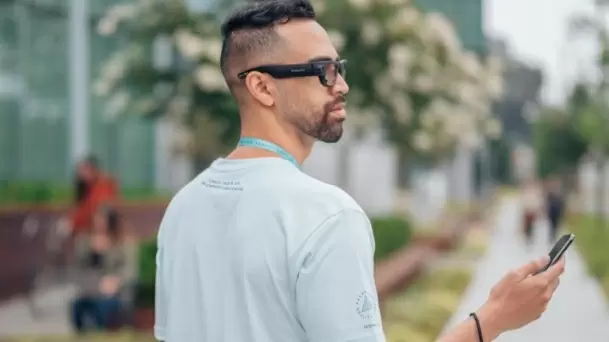100 Facebook employees to test future AR glasses on campus
San Francisco
17-September-2020

Photo: IANS
In an effort to build the first generation of wearable Augmented Reality (AR) like the way Google Glass once attempted, Facebook has launched a research project called Aria with 100 participants to begin with.
"The Project Aria glasses are not a consumer product, nor are they a prototype. They won't display any information on the inside of the lens, and research participants cannot view or listen to the raw data captured by the device," the company announced during its virtual ‘Facebook Connect' conference on Wednesday.
As a research device, the glasses will use sensors to capture video and audio from the wearer's point of view, as well as eye movement and location data to help engineers and programmers figure out how AR can work in practice.
"The glasses will encrypt, compress, and store data until it's uploaded to our separate, designated back-end storage systems".
Facebook announced a pilot programme with Carnegie Mellon University's Cognitive Assistance Laboratory to build 3D maps of museums and airports that will have multiple applications, including helping people with visual impairments better navigate their surroundings.
Facebook said it will not release the Aria device to the general public and it won't be available for sale.
Watch This TWL Video
"Starting in September, it will be made available to a limited group of Facebook employees and contractors in the US, trained in both where and when to use the device, and where and when not to," the company said.
The initial batch of research participants will be limited to about 100 Facebook employees and contractors, primarily located in the San Francisco Bay Area and Seattle.
All participants will first undergo training to learn where and when they should collect data. And they won't be able to access the data they collect.
"All devices will display a prominent white light that indicates when data is being collected. All devices will have a physical mute button that will stop collecting data when pressed," Facebook said.
Project Aria research participants will record in Facebook offices, wearers' private homes, and public spaces. They won't record in venues such as stores or restaurants without written consent from such venues.
"Recording is never permitted in sensitive areas like restrooms, prayer rooms, locker rooms, or in sensitive meetings and other private situations — and it is only allowed in the homes of wearers with consent from all members of the household".
As with any mapping data, security of recorded data is paramount.
Facebook said it will keep Project Aria data secure by using encryption and a secure ingestion system to upload the data from the device to Facebook back-end storage systems. - IANS
"The research glasses do not use facial recognition identification technology, and we don't use this data to inform the ads people see across Facebook products".
Project Aria will also provide the first-person perspective data necessary to build LiveMaps — the virtual 3D map needed to fulfill the potential of AR — and train a personalised assistant that can one day help people sense and understand the world, the company said.
More Headlines
PM Narendra Modi Makes Podcast Debut with Nikhil Kamath on 'People By WTF'
Laundry Startup Revivo Secures Pre-Seed Funding For Expansion
Bajrang Dal Appeals to Ban Oyo Check-Ins for Unmarried Couples in Bengaluru
Heavy Rains Predicted In Five TN Districts On January 11
Cold Wave Grips Rajasthan: Fatehpur Hits 1.1°C, Nagaur 1.7°C
PM Narendra Modi Makes Podcast Debut with Nikhil Kamath on 'People By WTF'
Laundry Startup Revivo Secures Pre-Seed Funding For Expansion
Bajrang Dal Appeals to Ban Oyo Check-Ins for Unmarried Couples in Bengaluru
Heavy Rains Predicted In Five TN Districts On January 11
Cold Wave Grips Rajasthan: Fatehpur Hits 1.1°C, Nagaur 1.7°C










